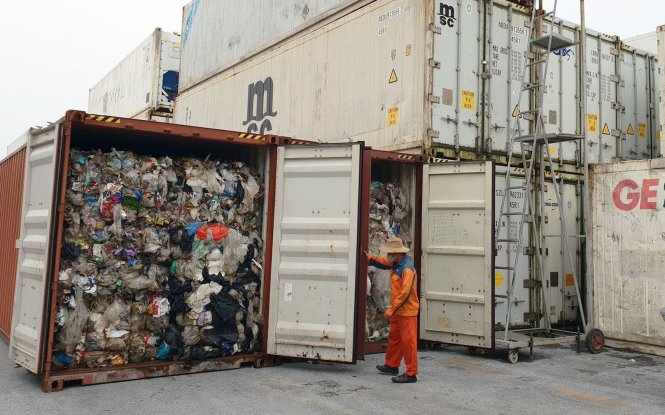Many firms in Vietnam have been using fake licenses, paperwork, and addresses to import substandard and prohibited scrap materials, making it difficult for customs officers to deal with the violation.
A massive amount of scrap has been stuck for a long time at multiple seaports across the country for failing to meet standards promulgated by local authorities.
Customs officers have been unable to contact the recipients as fake addresses and phone numbers had been shown on their import paperwork.
While some individuals and organizations have been caught committing such wrongdoings, many remain undetected.
In a recent case, the anti-smuggling division under the General Department of Vietnam Customs initiated legal proceedings against Duc Dat Company, based in the northern province of Ninh Binh, for forging import licenses.
An investigation by Tuoi Tre (Youth) newspaper reporters revealed that Duc Dat had been using fake import licenses, which were claimed to be issued by the Ninh Binh Department of Natural Resources and Environment, from September 2015 to late 2017.
In 2015, the firm made 25 import declarations at Cat Lai Port in Ho Chi Minh City and Cai Mep Port in southern Ba Ria-Vung Tau Province for a total of 564 metric tons of plastic scrap originating from various countries.
In 2017, the company submitted more than 1,630 declarations to import a whopping 53,300 metric tons of scrap at several ports in Ho Chi Minh City, Ba Ria-Vung Tau, and the northern city of Hai Phong.
The scrap was purchased from companies in Canada, the United Arab Emirates, Hong Kong, and Japan.
Competent authorities are unsure why the firm imported a large amount of scrap as it has no actual headquarters and factory.
In late August, officers also arrested Nguyen Van Son, director of Truong Thinh Company, and Duong Tuan Anh, who takes care of customs procedures at Hong Viet Company, for faking documents regarding their scrap imports.
Signs of tax evasion
According to regulations, a ten percent import tax and ten percent value-added tax are imposed upon scrap material shipments.
However, many businesses were caught declaring a lower price compared to the real cost to minimize taxes.
For instance, Ha Nam Company recently informed it had purchased scrap from South Korea’s Kukje Trading Company at US$120 per metric ton, with shipping fees included.
However, Kukje Trading answered Tuoi Tre in an email that its plastic scrap cost an average $480 per metric ton, which does not include shipping fees.
A brief survey also showed that businesses in Belgium, South Korea, Singapore, and the United States offer their plastic scrap at $300 to $500 per metric ton, with shipping costs covered.
Meanwhile, most firms in Vietnam declared such prices as between $80 and $130 per metric ton.
In August 2017, Duc Dat Company stated that its imported scrap cost only $0.05 to $0.12 per kilogram.
In June 2018, Lien Minh Company declared the price of its imported scrap as $98 per metric ton.
“There’s only one reason for businesses to declare false prices, which is to evade taxes,” Ha, an insider remarked.
Like us on Facebook or follow us on Twitter to get the latest news about Vietnam!


















































